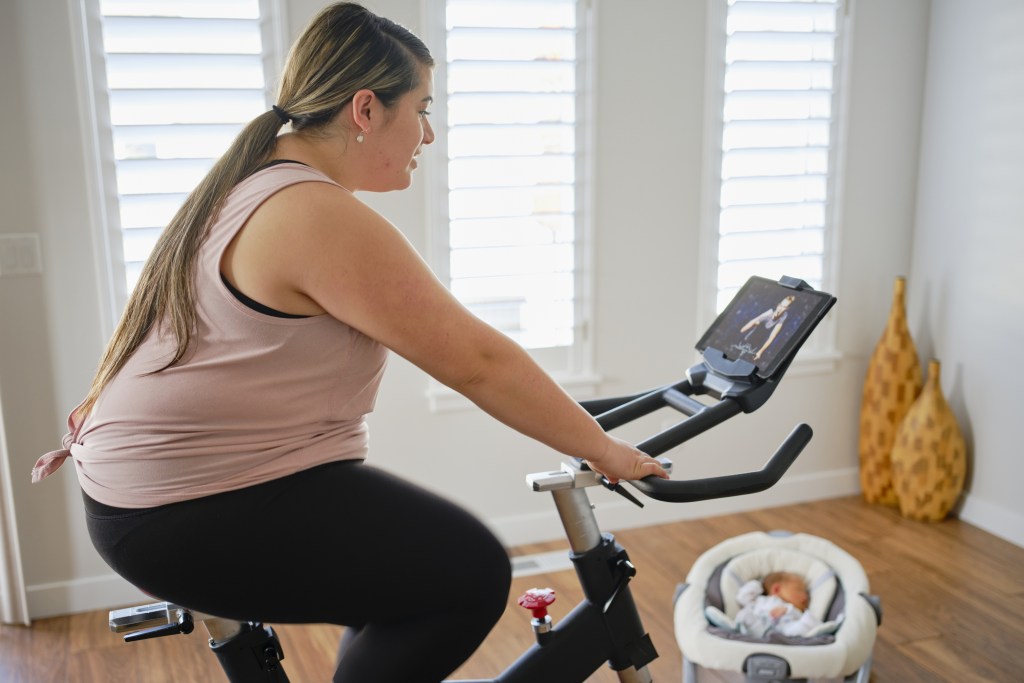Any woman who has ever been pregnant and delivered a child knows that as soon as the baby arrives, nothing will be the same again. Routines change, sleep is lost, and their bodies as they know it are constantly changing. For many women, being able to participate in a postpartum workout after childbirth isn’t just about losing pregnancy weight. It’s also about taking some much-needed time for themselves as they adjust to and embrace their new, postpartum body.
Pregnancy and childbirth can be very tough on a woman’s body so it’s important not to feel pressure to get back to a regular exercise routine before you are both physically and mentally ready. Many women are told that six weeks postpartum is the magic milestone when they’ll feel back to normal and able to engage in many of the activities they participated in before having the baby, but that’s not always the case. Here are seven important things you should know about postpartum exercise.

How soon after postpartum can I exercise?
Talk to your doctor. Every woman’s postpartum body is different, so there are no hard and fast rules about when it’s acceptable to begin a postpartum workout. Speaking with your doctor is important in ensuring you can safely return to exercise. A doctor’s advice will differ depending on your health and fitness levels before giving birth as well as how easy, or difficult, your birth was. Whether you had a vaginal birth or c-section will also impact your doctor’s decision on how soon after postpartum you can exercise.
Recovery is important
It’s important to take the time to fully recover before beginning any postpartum workout to avoid injury. “The body changes slowly during pregnancy. The body’s center of mass shifts forward, posture changes, and even the curvature of the back is affected,” Sarah Clampett, a physical therapist specializing in postpartum health and clinical director at Origin Physical Therapy explained to TODAY. “It then changes again — and quickly — after delivery.” Clampett also stresses that exercising while fatigued can lead to injury. “At six weeks, the fatigue is real and hormones are still balancing,” she noted. “Women should listen to their bodies and start light and then slowly increase the intensity of their exercise.”
Start slow
Once you’ve been given the approval by your health care professional to begin exercising, it’s important you start slow and listen to your body. OB/GYN Kameelah Phillips, MD explained to Parents that while each woman’s postpartum recovery is different, starting slowly can benefit everyone. “I usually recommend you take ibuprofen prior to any return to activity because the uterus is still healing and can cause discomfort. Give your body a little time to heal and enjoy a leisurely walk,” Phillips suggested. Starting slow allows you to make sure you’re feeling well as you exercise and you’re not exerting yourself too much. If you feel better you can slowly begin to increase your exercise routine.
The core is key
It can be incredibly discouraging for women after taking part in their first postpartum workout. “Most women are surprised by just how different their core feels once baby has arrived,” trainer Maura Shirey, a certified pregnancy fitness educator told SHAPE. “The core remains overstretched and the woman is left with a belly that feels very different. Women will describe feelings of vulnerability, disconnection, absence, vacancy, and nonexistence when referencing how their postpartum core feels in the early days.” Diastasis recti, which is when your abdominal muscles separate, is also an extremely common occurrence after delivery. Paying attention to your core is an important part of your postpartum workout.
Benefits of postpartum exercise
There are so many benefits to exercising after childbirth. Obviously, there are the physical benefits of being active and moving, which help with weight loss and boosting energy, but there are also many mental health benefits. The American College of Obstetricians and Gynecologists says that postpartum exercise can also help you sleep better, relieve stress, and possibly help prevent postpartum depression.

Good exercises to begin with
If you’re just starting to work out after your baby’s birth, experts suggest starting with more low-impact exercises. Mustela suggests exercises such as walking, swimming, water aerobics, and yoga as a great place to start. Low-impact activities including the stationary bike and elliptical machine are also a good way to participate in a cardio workout without the impact. Many gyms or community centers will also offer classes for new moms that are a great way to get back into an exercise routine.
Warning signs to watch for
There are some warning signs all postpartum women should be on the lookout for after starting a postpartum exercise routine, all of which could be signs they’re doing too much. Mustela writes that if you are left feeling exhausted instead of feeling more energetic after a workout, it may be time to take it easy. This advice is also beneficial if your muscles are overly fatigued or sore after a workout, if you have shaky muscles, or have a morning resting heart rate 10 beats per minute higher than your typical heart rate.
Postpartum workouts may be a lot or a little different than your pre-pregnancy workouts, but that doesn’t mean you can’t enjoy getting a little exercise. Always make sure you speak to your doctor first before beginning any exercise routine and make sure you listen to your body so you’re not pushing yourself too hard. Pregnancy and childbirth can put a lot of strain on your body so make sure you give yourself a little grace and have some patience when you start to exercise.



